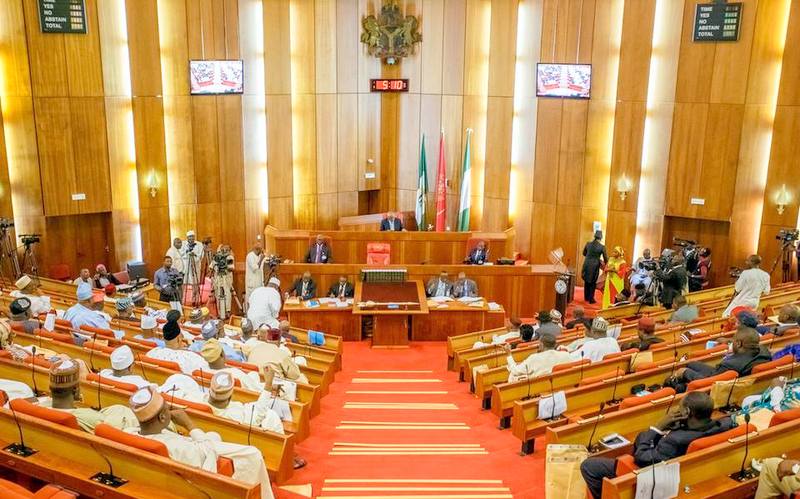Senators considering the amendment of the 1999 constitution, on Wednesday, rejected devolution of power to give more legislative powers to states.
The rejection was the outcome of electronic voting on the bill to alter the second schedule, Part I & II of the constitution, to move certain items from the exclusive to the concurrent legislative list to give more legislative powers to states and 32 other bills.
During the voting, 46 senators voted in favour of devolution of power, 48 senators voted against it while one senator abstained.
The senators also rejected the bill that sought to alter the constitution to delete the Land Use Act from the constitution to subject it to regular process of amendment.
The lawmakers also rejected the bill that sought to alter section 25 of the constitution which guarantees the right of a married woman to choose her indigeneship by birth or by marriage for the purposes of appointment or election.
The senators also rejected the bill which sought 35 per cent affirmative action for women.
Although the bill was passed by simple majority, it was not passed by two-thirds majority of senators.
Forty nine senators voted in favour of the bill, 43 senators voted against it while two abstained.
Similarly, the bill seeking to enhance clarity with respect to the procedure for state creation and boundary adjustment was rejected.
However, the bill seeking to alter sections 65, 106, 131, and 177 of the constitution to expand the political space and broaden options for the electorate by allowing for independent candidacy in all elections was approved.
The senators approved alteration of sections 4, 51, 67, 68, 93 and 109 of the constitution to provide immunity for members of the legislature.
The immunity is in respect of words spoken or written at plenary or at committee proceedings.
The alteration also obligates the President to attend a joint session of the National Assembly once a year to deliver a state of the nation address among others.
The bill seeking to alter sections 58, 59 and 100 of the constitution to resolve the impasse where the President or Governor refuses to signify his/her assent to a bill or withhold such assent for timely passage of laws was approved.
Furthermore, the bill to amend the Third Schedule of the constitution to include former Presidents of the Senate and Speakers of the House of Representatives in the composition of the Council of State was approved.
The bill seeking to reduce age qualification for offices of the President and Governor and membership of Senate, House of Representatives and state Houses of Assembly was approved.
The senators also approved the bill seeking to provide for time within which the President or Governor shall lay the Appropriation Bill before the National Assembly or House of Assembly for early passage.
The bill seeking to alter section 162 of the constitution to abrogate State Joint Local Government Accounts and empower each Local Government Council to maintain its own special account was approved by the senators.
Similarly the bill to strengthen local government administration by guaranteeing the democratic existence, funding, and tenure of local government councils scaled through.
The bill to set a time frame within which the President or Governor shall forward to the Senate or State Houses of Assembly, names of nominees for confirmation as ministers or commissioners scaled through.
The change in the name Nigeria Police Force to Nigeria Police; separation of the Office of Attorney-General of the Federation and of State from the Office of Minister or Commissioner of Justice was approved by the senators.
The lawmakers also approved the establishment of Investment and Securities Tribunal.
The senators gave approval for the decree establishming the National Youth Service Corps should be deleted from the constitution so that it could be subjected to regular process of amendment.
The bill seeking to among other things, provide procedure for passing Constitution Alteration Bill where the President withholds assent was also approved.
The senators scrapped State Independent Electoral Commission from the constitution.
In his remarks at the end of the voting, the President of the Senate, Dr Bukola Saraki, commended the efforts of the Deputy Senate President, Sen. Ike Ekweremadu, who chaired the Constitution Review Committee and members of the committee.
“This is an exercise that we gave a promise and we have kept to it.
“We have made history for this to happen; we have carried out the exercise not only on time, but also in the content.
“What we have done today definitely is to lay the foundation for far reaching reform of our political, economic and social development.
“We have by the amendments we have done today redefined our budget processes.
“We have addressed issues that have bogged us down for many years; we have addressed the issue of savings which has always been an issue in this country for many years.
“The fact is that as a nation we are not saving; as a nation we now have a constitution that makes it paramount for us to save,” he added.
Saraki said the progress made in the amendment of the conmstitution, showed the commitment of the 8th Assembly to the fight against corruption.
Saraki said: “we have opened the room for a new Nigeria where younger people can be elected for all the positions.
“We have laid a new foundation and a new Nigeria that will be more committed to creating opportunities for the young people and place us properly in the global world.
“To be part of that history is a great honour for all of us and I want to thank you all for the effort.’’
The News Agency of Nigeria (NAN) reports that after the voting on the amendments by both the Senate and House of Representatives, two third majority of state assemblies are expected to vote for the amendments.
Thereafter the amendments would be transmitted to the President for his assent. (NAN)

